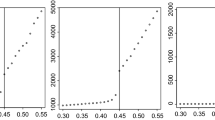Abstract
Efficient energy production and distribution systems are urgently needed to reduce world climate change. Since modern district heating systems are sustainable energy distribution services that exploit renewable sources and avoid energy waste, in-depth knowledge of thermal energy demand, which is mainly affected by weather conditions, is essential to enhance heat production schedules. We hence propose a mixture copula-based approach to investigate the complex relationship between meteorological variables, such as outdoor temperature and solar radiation, and thermal energy demand in the district heating system of the Italian city Bozen-Bolzano. We analyse data collected from 2014 to 2017, and estimate copulas after removing serial dependence in each time series using autoregressive integrated moving average models. Due to complex relationships, a mixture of an unstructured Student-t and a flipped Clayton copula is deemed the best model, as it allows differentiating the magnitude of dependence in each tail and exhibiting both heavy-tailed and asymmetric dependence. We derive the conditional copula-based probability function of thermal energy demand given meteorological variables, and provide useful insight on the production management phase of local energy utilities.












Similar content being viewed by others
References
Box GE, Jenkins GM (1970) Time series analysis: forecasting and control. Holden-Day, San Francisco
Brechmann EC, Schepsmeier U 2013 Modeling dependence with c- and d-vine copulas: the r package cdvine. J Stat Softw 52(3):543–552
Dalvit G (2017) Modelling and Optimisation of a District Heating System. Master’s thesis, Free University of Bozen-Bolzano, Italy
Dempster A, Laird N, Rubin D (1977) Maximum likelihood from incomplete data via the em algorithm. J R Stat Soc Ser B 39(1):1–38
Di Lascio FML, Menapace A, Righetti M (2020) Joint and conditional dependence modelling of peak district heating demand and outdoor temperature: a copulabased approach. Stat Methods Appl 29(2):373–395
DPR Decreto del Presidente della Repubblica n 74 (16 aprile 2013) Regolamento recante definizione dei criteri generali in materia desercizio, conduzione, controllo, manutenzione e ispezione degli impianti termici per la climatizzazione invernale ed estiva degli edifici e per la preparazione dell’acqua calda per usi igienici sanitari, a norma dell’articolo 4, comma 1, lettere a) e c), del d.lgs. 19 agosto 2005, n. 192 della repubblica n. 74
Durante F, Sempi C (2015) Principles of Copula Theory. Chapman and Hall/CRC, Boca Raton
Eriksson O, Finnveden G, Ekvall T, Björklund A (2007) Life cycle assessment of fuels for district heating: a comparison of waste incineration, biomass- and natural gas combustion. Energ Policy 35(2):1346–1362
Frederiksen S, Werner S (2013) District Heating and Cooling. Studentlitteratur AB
Genest C, Ghoudi K, Rivest LP (1995) A semiparametric estimation procedure of dependence parameters in multivariate families of distributions. Biometrika 82:543–552
Grønneberg S, Hjort NL (2014) The copula information criteria. Scand J Stat 41:436–459
Hu L (2006) Dependence patterns across financial markets: a mixed copula approach. Appl Financ Econ 16(10):717–729
Joe H, Xu JJ (1996) The estimation method of inference functions for margins for multivariate models. https://doi.org/10.14288/1.0225985
Kojadinovic I, Segers J, Yan J (2011) Large-sample tests of extreme-value dependence for multivariate copulas. Canad J Stat 39(4):703–720
Longla M (2015) On mixtures of copulas and mixing coefficients. J Multivariate Anal 139:259–265
Lund H, Hvelplund F, Kass I, Dukalskis E, Blumberga D (1999) District heating and market economy in latvia. Energy 24(7):549–559
Lund H, Østeraard PA, Chang M, Werner S, Svendsen S, Sorknæs P, Thorsen JE, Hvelplund F, Mortensen BOG, Mathiesen BV, Bojesen C, Duic N, Zhang X (2018) The status of 4th generation district heating: research and results. Energy 164:147–159
Mathiesen BV, Lund H, Karlsson K (2011) 100% Renewable energy systems, climate mitigation and economic growth. Appl Energy 88(2):488–501
Moritz S, Bartz-Beielstein T (2017) imputeTS: time series missing value imputation in R. R J 9(1):207–218
Moritz S, Sardá A, Bartz-Beielstein T, Zaefferer M, Stork J (2015) Comparison of different methods for univariate time series imputation in R. arXiv eprint arXiv:1510.03924
Nelsen RB (2006) Introduction to copulas. Springer, New York
Patton AJ (2012) A review of copula models for economic time series. J Multivariate Anal 110:4–18
Rémillard B, Scaillet O (2009) Testing for equality between two copulas. J Multivariate Anal 100(3):377–386
Sklar A (1959) Fonctions de répartition à \(n\) dimensions et leures marges. Publi l’Inst Stat L’Univ Paris 8:229–231
Soutullo S, Bujedo L, Samaniego J, Borge D, Ferrer J, Carazo R, Heras M (2016) Energy performance assessment of a polygeneration plant in different weather conditions through simulation tools. Energy Build 124:7–18
Sun Q, Li H, Ma Z, Wang C, Campillo J, Zhang Q, Wallin F, Guo J (2016) A comprehensive review of smart energy meters in intelligent energy networks. IEEE Internet Things J 3(4):464–479
Trivedi PK, Zimmer DM (2005) Copula modeling: an introduction for practitioners. Foundations and Trends in Econometrics 1:1–111
Vrac M, Billard L, Diday E, Chédin A (2012) Copula analysis of mixture models. Comput Stat 27(3):427–457
Zimmer DM, Trivedi PK (2006) Using trivariate copulas to model sample selection and treatment effects: application to family health care demand. J Bus EconStat 24:63–76
Acknowledgements
We thank the two anonymous reviewers for comments that greatly improved the development of this work. The first author (corresponding author F. Marta L. Di Lascio) acknowledges the support of the Free University of Bozen-Bolzano, Faculty of Economics and Management, via the project “The use of Copula for the Analysis of Complex and Extreme Energy and Climate data” (CACEEC). The second author (Andrea Menapace) acknowledges Alperia and the Bozen-Bolzano province for providing the analysed data. The third author (Maurizio Righetti) acknowledges the support via the project “Thermo Fluid Dynamics, infrastructures for applied research to business and industry in South Tyrol” (LTFD), ERDF (European Regional Development Fund) 2014-2020 Programme, CUP I52F16000850005.
Author information
Authors and Affiliations
Corresponding author
Additional information
Handling Editor: Bryan F. J. Manly.
Rights and permissions
About this article
Cite this article
Di Lascio, F.M.L., Menapace, A. & Righetti, M. Analysing the relationship between district heating demand and weather conditions through conditional mixture copula. Environ Ecol Stat 28, 53–72 (2021). https://doi.org/10.1007/s10651-020-00475-z
Received:
Revised:
Accepted:
Published:
Issue Date:
DOI: https://doi.org/10.1007/s10651-020-00475-z




